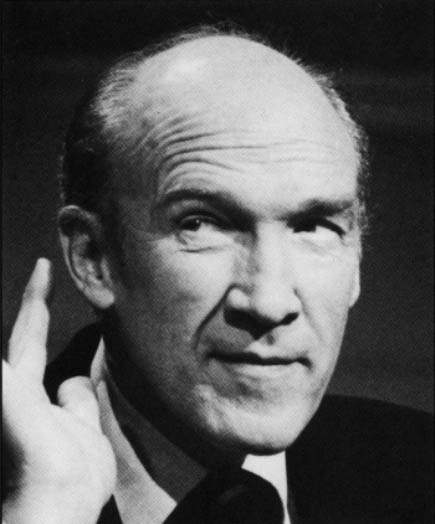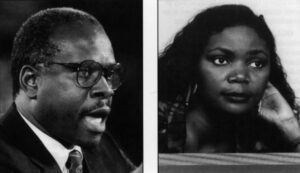It’s been almost two years since millions of Americans sat riveted in front of their televisions, witnessing the Clarence Thomas-Anita Hill hearings before the Senate Judiciary committee. That’s a long time ago by Washington standards, where big stories can become ancient history within weeks if not days.

Anita Hill
Baucus said she called members of the Senate Judiciary committee because whe couldn’t tolerate seeing Anita Hill “suffering at the hands of a bunch of thugs, and that was how they were treating her. It was frightening to see them all gang up on her.”
AP/Wide World Photos

Wanda Baucus
Wanda Baucus, a former Harvard professor who is now an artist, says “there is no place where women self-censor the way they do in Washington.”
AP/Wide World Photos
But Delaware Sen. Joseph Biden, who chaired the Supreme Court nomination hearings, isn’t the least bit surprised that interest in Anita Hill has not gone away. “I argued from the day the hearings began that the reason why the nation was energized and fixated was because” the hearings laid bare “a fundamental power struggle going on in this country between women and men. It is so much deeper than Anita Hill or Clarence Thomas or sex harassment in and of itself,” he says. Many Washington women agree. In more than two dozen interviews over the past year, prominent women say the treatment Anita Hill got at the hands of Biden’s committee reflects an entrenched sexism that pervades the city’s corridors of power.
But the more prominent they are, the less likely they are to talk—at least on the record. Wanda Baucus, an abstract artist, former Harvard professor and former top aide to two senators, is an exception. Washingtonians are still awed by her boldness during the October 1991 Thomas-Hill hearings. Baucus, who is married to Montana Sen. Max Baucus (D), says she was so appalled by the way senators were treating Anita Hill that she called many of them, including several on the Senate Judiciary Committee, to let them know that Anita Hill’s delayed response to Thomas’s reported behavior was entirely believable.
She was speaking, she wanted them to know, from experience. Baucus said she had received unwanted attention from two senators, including persistent phone calls from one while she was working in the Senate and a roving hand under the table from another when she was attending a dinner party with her husband. Both times she rebuffed the senators but did not publicly call them on their behavior.
Until Anita Hill broke what Harvard psychologist Judith Jordan calls the code of silence women have been culturally conditioned to accept, most women — including Baucus — too often seethed in silence, reluctant to talk for the very reason Anita Hill had wanted to remain anonymous — fear. Fear they wouldn’t be believed. Fear they would be considered not a team player and only hurt themselves. Fear they would be marginalized as feminists or as Rush Limbaugh has called them, “femi-nazis.”
Political wives traditionally have been more restrained than most. Almost twenty years ago, author Myra McPherson observed in her book, “The Power Lovers,” that “traditional political wives for the most part have given up their freedom of expression and are so trained to be correct at all times that they either become nonentities or give that impression publicly.”
Baucus says Washington “is the strangest town I have ever lived in. I have lived in New York, Cambridge, Florida, Europe, and there is no place where women self-censor the way they do in Washington.”
Time seems only to have emboldened Wanda Baucus. She says she refuses to be silenced — even by powerful senators. Although she won’t say which senator grabbed her under the table — “to confront him would have hurt his wife, brought her pain,” she has explained — in this interview, she does go far beyond her public statements of almost two years ago.
She explains why if she had been married to a man such as Wyoming Republican Sen. Alan Simpson, she would have left him, or at least changed the locks on the doors for a few nights. She also tells why she called Virginia Democratic Sen. Charles Robb’s office to demand that he fire the aide who attempted to silence Tai Collins, a former beauty queen who said she had an extramarital relationship with Robb.
Wanda Baucus says she called members of the Senate Judiciary Committee because she couldn’t tolerate seeing Anita Hill “suffering at the hands of a bunch of thugs, and that was how they were treating her. It was frightening to see them all gang up on her.

Clarence Thomas
Most of the senators Bacus called during the hearings on Clarence Thomas “gave me their own stories, which made me realize that what they were saying on TV, making a mockery of Anita Hill, was a sham of the democratic process.”
AP/Wide World Photos

Sen. Alan Simpson
When Baucus called Sen. Alan Simpson (R-Wyoming) to say many professional women have had experiences like Hill’s, he told her, “Oh, yes, I know. This happened to my wife, Ann too.” So Bacus concludes that the impression Simpson left “on television was totally false…”
AP/Wide World Photos
“It wasn’t even a decision. I didn’t even think about it. As soon as I heard Alan Simpson say, `Here we are in Washington D.C., and of all places for her not to be able to come out and say this. She’s being harassed in this city where we really take care of women.’ I thought, `What a clown! This man is making a total mockery,’ and I think he was the first person I called. I didn’t weigh the political consequences. I just picked up the phone and said, `Alan, you know you can’t say this woman is not credible because she is here in Washington D.C. where she is protected against discrimination.’ I said that I hardly know one professional woman who this has not happened to.
“And then he said, `Oh, yes, I know. This happened to my wife Ann, too. We were married 30 years before she finally told me.’ And his words were something like `and the shit hit the fan; it was a traumatic experience for the whole family because she kept it quiet even from me for 30 years.'” And therefore, Baucus believes the impression Simpson left “on television was totally false. He was pretending that he couldn’t believe this, but he had his own personal experience. So he was being certainly less than honest with the American people in trying to degrade Anita Hill for being quiet.
“Arlen Specter listened. They all listened and most of them gave me their own stories which made me realize that what they were saying to the American people on TV, making a mockery of Anita Hill, was a sham of the democratic process. I mean, the irony is that this is the Senate Judiciary Committee. And I think it is the first time in my life that I have realized that the people who represent us don’t represent us. At least they don’t represent women, so this whole category of people is being treated like this, and we are in great trouble.
George Bush said during the hearings, `We will do anything to win.’ “If your mother or George Bush’s mother or Arlen Specter’s mother had been sitting in Anita Hill’s place, they would have been treated the same way because George Bush is going to do anything to win. The Republicans were hit men for the White House. The president says, `We’ll do anything to win,’ and that’s what they did.”
She did not call Sen. Strom Thurmond. “No, no. I figured he’s a lost cause. And I did not talk to Orrin Hatch because I think both of them are just too far gone to even understand.”
“I think there is harassment on Capitol Hill. After the Clarence Thomas hearings, I heard from several staffers on Capitol Hill –those other women in Washington who either had been or at the time were being harassed by people but who had never said anything about it. Some of these people I knew quite well, and I was just surprised. I don’t think it’s commonplace, but I don’t think Washington is any different; I think it’s all over America.”
“I don’t know if Congress should be held to a higher standard. I think the same standard should be all over the country — that men should not harass women publicly or privately, period. I think the hypocrisy of members of the Senate Judiciary Committee standing up and acting as though they’re so surprised [that it exists] is what’s disgusting.” Their pretending “is more disgusting than the harassment itself.”
Baucus thinks there is a relationship between a politician’s private and public behavior. Take Alan Simpson. She says that he, “more than anyone,” in effect “laughed at women for suffering” by saying in response to Anita Hill’s testimony, “How could anybody be silent this long?”
“And it showed me that here is a person who is representing millions of people in America who does not understand the nature of suffering.
“The very nature of suffering means you’re quiet about it. Somebody is hurting you. So for a man to stand up and laugh at women and say, `You wouldn’t suffer silently; if you were suffering, you’d go out and tell about it.’ That just tells me that this person is extremely insensitive.
“And a few days after that, his wife Ann had a 60th birthday party, and he walked in and in front of all her friends, not a lot of people but a small private gathering, and said, `I can’t believe I’m sleeping with a 60-year- old woman.'”
Baucus says such behavior would make her consider leaving “a man who did that….or at least change the locks on the doors for a few nights. I mean, you’ve got to get through to these men. They can’t do this. But if his wife is letting him get away with it, then he thinks he can get away with it with all American women, right?
“She is the one who he said experienced something in her youth that it took her many years ….I don’t know what it was, but after many years of silence in their marriage, she told him about it.”
(A spokesperson says that neither the senator nor his wife wants to discuss the incident, adding that Ann Simpson says her experience did not occur in the workplace. As for the birthday party comment, Simpson’s chief-of-staff Don Hardy says it was said “in good taste and humor.” The senator simply was “characterizing the fact that he’s been with her all these years and how she’s 60-year-old and he’s still there,” says Hardy.)
Washington women’s “self-censorship,” says Baucus, “is absolutely phenomenal.”

Sen. Charles Robb
Baucus was “outraged” when she saw that Sen. Charles Robb (D-Virginia) basically defended his staff person threatening Tai Collins, a former Miss Virginia/USA, who said she had an affair with Robb. “I went straight to the telephone, and I called Chuck Robb’s office…”
AP/Wide World Photos
How does she explain it?
“It’s a man’s town, and even Elizabeth Taylor when she was married to a member of the Senate, left saying it’s a wonderful place for men to live, but it’s a deadly city for women.
“If the women I know in Washington in the Senate talked and said all the things they know, this government would — I mean talk about the revolution….I mean this place would be turned upside down.”
Baucus thinks Virginia Sen. Charles Robb’s staff tried to silence her when she complained about the way Tai Collins, a former Miss Virginia/USA who says she had a sexual relationship with Robb, was treated by a top aide to Robb. She thinks Collins’ case also illustrates “what happens to women who talk” and why women have been conditioned to remain silent.

Tai Collins
What concerns Baucus is that Tai Collins became “the victim…The clever thing that woman did was to have a tape recorder. If Anita Hill had had a tape recorder, Clarence Thomas would not be a Supreve Court member right now.”
AP/Wide World Photos
During the late 1980s and early 1990s, Robb and his staff were trying to contain media reports about allegations involving the senator’s social life when he was governor of Virginia in the 1980s. Allegations had been made about his attending parties with a fast crowd at Virginia Beach, where drugs, such as cocaine, allegedly were used openly. Robb, who has promoted an image of a clean-cut Marine and milk-drinking family man, has acknowledged “some peccadilloes.” He has said that “I clearly placed myself in circumstances a couple of times that I would describe as …inappropriate for a happily married family man.” He has denied using or knowlingly being in the presence of illegal drugs or being unfaithful to his wife.
For six months in 1990, Robb’s social life as well as rumors of his infidelity were investigated by reporters for The Washington Post, who eventually interviewed Collins. Collins told the reporters she decided to tell them about what she described as an affair with Robb, because she said she had been subject to a barrage of intimidating meetings with Robb’s attorneys and staff, where she was cautioned to keep quiet, and she wanted the harassment to end.
At one meeting late in 1990, Robb’s chief of staff David K. McCloud visited Collins, warning her not to tell reporters of her alleged relationship with Robb. Robb has acknowledged that Collins came to his New York hotel room and shared a bottle of wine; he took off his clothes, and she gave him a massage — period. Her claims of sexual activity are “categorically false,” he has told reporters.
“The minute you start talking to The [Washington] Post, the problems begin, end of subject,” McCloud was reported to have said in a recording Collins secretly made. The disclosure came on the April 28, 1991, Sunday night Exposé program, in which Robb appeared. Baucus saw that show and immediately reached for the phone and called Robb’s office.
“What concerns me and other women is that a member of his staff who is paid with taxpayers’ money, threatens a woman in order to whitewash the image of Sen. Robb. The woman here becomes the victim because all the men, including a member of the Senate, closed ranks and went after her. And to me that’s very dangerous. And so, if you are threatened like that, then, of course, the pressure is on you to be quiet. The clever thing that woman did was to have a tape recorder. If Anita Hill had had a tape recorder, Clarence Thomas would not be a Supreme Court member right now.
“Sen. Robb basically defended his staff person threatening this woman. And when I heard that, I was just outraged. I went straight to the telephone, and I called Chuck Robb’s office and got a recording because it was a Sunday evening. I said, —`This is Wanda Baucus calling. I would like to leave a message for Sen. Robb. I think your staff person David McCloud should resign immediately. He is very dangerous and a threat to the women of this country. And you should not be using taxpayers’ money to support this sort of thing. And if he doesn’t resign within a reasonable period of time, I will personally organize all the `ladies in the Senate’ to help you and him understand why he should resign.
“And it was like a bomb dropped. The next morning my husband’s office received a call. And they then tried to silence me by going through Max. I think Max was out of town, so they called his administrative assistant and said, `we have this voice on the the telephone recorder claiming she’s Max’s wife. And this is what she is saying.’ They made a big deal about it thinking Max would be so outraged that he would silence me.
And Max said, `What do you mean, a voice? —`That is Wanda. Of course, she called. I support her completely if that’s what she thinks is right. This is a free country.’ Robb’s staff just couldn’t believe that Max was taking up for me. So it all backfired on them. You see they were trying to get me to be quiet. I was a `lady in the Senate’; how could I speak out against another member of the Senate?
“You see, how can a woman in this town do what she thinks is right and stick up for other women, whether it’s this woman, whose life is being threatened because she was talking about what actually happened with a member of the Senate she was with, or whether it’s Anita Hill or anyone else? I mean, if these kinds of pressures are being brought to bear on us – – fortunately, I am not intimidated by these people.”
(McCloud, now an executive with the Washington public relations firm, Burson-Marsteller, resigned a few months after the NBC Exposé show. In May, 1992, he pled guilty to charges he helped disclose an illegally intercepted cellular phone converstation of then Lt. Gov. Doug Wilder, a Robb political nemesis, and also to a campaign finance violation. According to court records, mcCloud authorized the disguising of money speont on the trip to Boston by a Robb aide. The purpose of the trip, which showed up in a Federal Election Commission report as a “fundriaser,” was to talk to a student at M.I.T. to see whether she would provide damaging information about Robb to the press. McCloud would not comment on Baucus’ account, except to say that the NBC Exposé show was “dramatically skewed,” so he can understand why a viewer “would have a bad opinion of me.”
Robb spokesperson Peggy Wilhide acknowledged the senator is aware Wanda Baucus left a message on his office phone machine, but if he had to guess, he would say the message had been about his vote to approve Clarence Thomas. The senator has no knowledge of anyone from his staff calling senator Baucus’ office about Wanda Baucus’ call, she adds.)
“I think there are women in Washington who join this men’s club in trying to make fun of and intimidate other women into being silent….”
She points to a controversial article written last year by former Washington Post Style reporter Sally Quinn. Quinn argued that the women’s movement is completely out of step with mainstream women and that “feminism, as we have known it, is dead.” She criticized the leaders of the women’s movement such as Gloria Steinem, saying they may have outlived their effectiveness and should not “lead the next generation” if “they continue down the same path.” Gloria Steinem is a friend who sometimes stays with Baucus when she is in Washington.
“Women have to take care of women. This kind of tract that Sally Quinn publishes undermines the efforts of every woman of integrity. This is like joining the enemy. It’s what the men do. It’s another Clarence Thomas. To me, Sally Quinn and Clarence Thomas are doing the same thing to women. Because what [she] is doing is trying to punish women who have courage, integrity and honesty and are out really earning their own money, taking care of their children, paying their own bills — she’s harassing them while they’re trying to work, making fun of them because they don’t hold up to her … standards or whatever.”
“A lot of people have been pessimistic about the feminist movement and said it really didn’t get us anywhere. I don’t agree with that. We’re in a lot better shape than our mothers were.”
As for the backlash against abortion rights, “that’s a very conservative Republican administration packing the Supreme Court with men, and the women who feel they can dictate people’s personal private lives, in particular, women. And again, people, mostly men, who are very afraid of women because they control their own physical being which is very powerful — it can give birth….”Men would like to take that right away from women and control it themselves. And if the government has control of it, it means that men control it.”
Baucus thinks three recent major events demonstrate that Americans increasingly are “refusing to accept white male power.” The Senate Judiciary Committee’s treatment of Anita Hill, the beating of Rodney King, and the harassment of women by Navy pilots at the Tailhook convention “are all part of the same phenomenon.”
“It’s men using their power in the structure of their jobs to harass either women or minority groups, and finally these women and minority groups are standing up and saying, `You’re not doing it any longer.’ It is as if there is a social revolution going on in this country, and we are all finally saying, —No!'”
@1993 Florence Graves
Florence Graves, the founding editor of Common Cause Magazine, is a research fellow at Harvard University’s Institute of Politics. One of the reporters who broke the Sen. Bob Packwood sexual misconduct story in The Washington Post, she is researching the imbalance of power between women and men in Washington.


